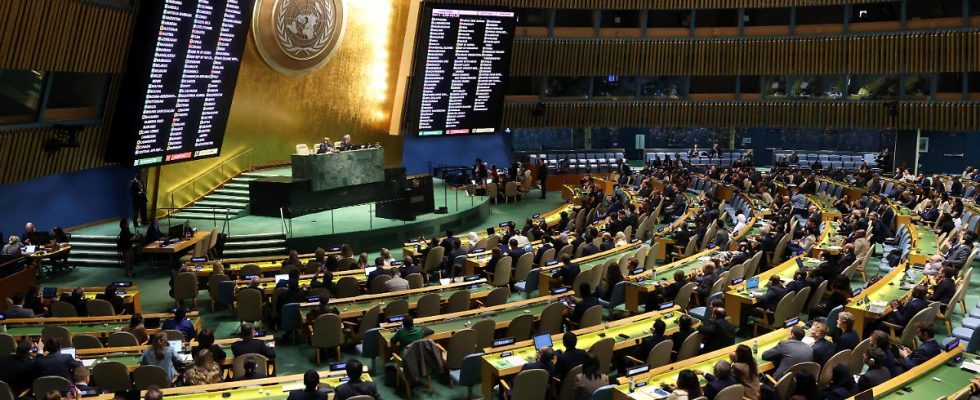Germany abstains
UN General Assembly votes for immediate ceasefire in Gaza
October 27, 2023, 10:39 p.m
Listen to article
This audio version was artificially generated. More info | Send feedback
After several failed draft resolutions, the UN Security Council makes another attempt to accept the call for an “immediate humanitarian ceasefire”. The symbolic paper has been passed – but the committee does not appear to be united.
The UN General Assembly has adopted a resolution to improve the humanitarian situation and call for an immediate ceasefire in the Gaza Strip. The paper achieved a necessary two-thirds majority in New York. 120 countries voted in favor, 14 against, 45 abstained, including Germany. However, resolutions of the UN General Assembly are not legally binding, but are considered symbolic.
The more powerful UN Security Council, whose resolutions are binding, had previously failed several times to pass a resolution with a humanitarian focus on the situation in the Gaza Strip. The resolution that has now been adopted condemns, among other things, all violence against Israeli and Palestinian civilians, calls for the immediate and unconditional release of all civilians “illegally detained” and demands unhindered access for humanitarian aid to the Gaza Strip. The text also calls for an “immediate permanent and sustainable humanitarian ceasefire” that should lead to a “cessation of hostilities.”
Canada had previously introduced an amendment to the resolution condemning the “terrorist attacks by Hamas” and the hostage-taking and calling for the immediate and unconditional release of the hostages. However, this addition failed to achieve the necessary two-thirds majority. According to Federal Foreign Minister Annalena Baerbock, this is also the reason why Germany abstained: “Because the resolution does not clearly name Hamas terror, does not call for the release of all hostages clearly enough and does not reaffirm Israel’s right to self-defense, we agree “Many of our European partners decided not to agree to the resolution in the end,” said Baerbock after the vote, according to the statement.
The release of all hostages was also not called for clearly enough and Israel’s right to self-defense was not affirmed, said Baerbock. After all, in the negotiations on the resolution tabled by Jordan, the Palestinians achieved that the acts of terrorism were condemned and at least included a call for the hostages to be released.
Israel: “Dark day for the UN”
The text also expresses “concern at the recent escalation of violence since the October 7 attack” – without mentioning Hamas by name. Israel’s UN ambassador Gilad Erdan denounced this shortage with sharp words. “The only place this resolution belongs is in the dustbin of history,” Erdan said after the vote. Israel will continue to use “all means” in the fight against Hamas. “This is a dark day for the UN and for humanity,” Erdan said. The day will “go down in history as a disgrace.” The UN has shown that it no longer has the slightest legitimacy or relevance.
Before the vote, the member states were divided. For example, while the representatives of Egypt and Qatar advocated for the adoption of the resolution, the USA spoke out clearly against it. The vote also revealed the different attitudes of Western countries towards Israel’s actions after the Hamas attack in the Gaza Strip: While France voted for the resolution, Germany, Italy and Great Britain abstained. In addition to the USA, Austria also voted against the text.
The session of the UN General Assembly was also called because the UN Security Council had not yet been able to agree on a resolution with a humanitarian focus. It was only on Wednesday that two draft resolutions failed again in the committee. Malta then announced that the ten non-permanent members of the UN Security Council wanted to submit their own resolution.

